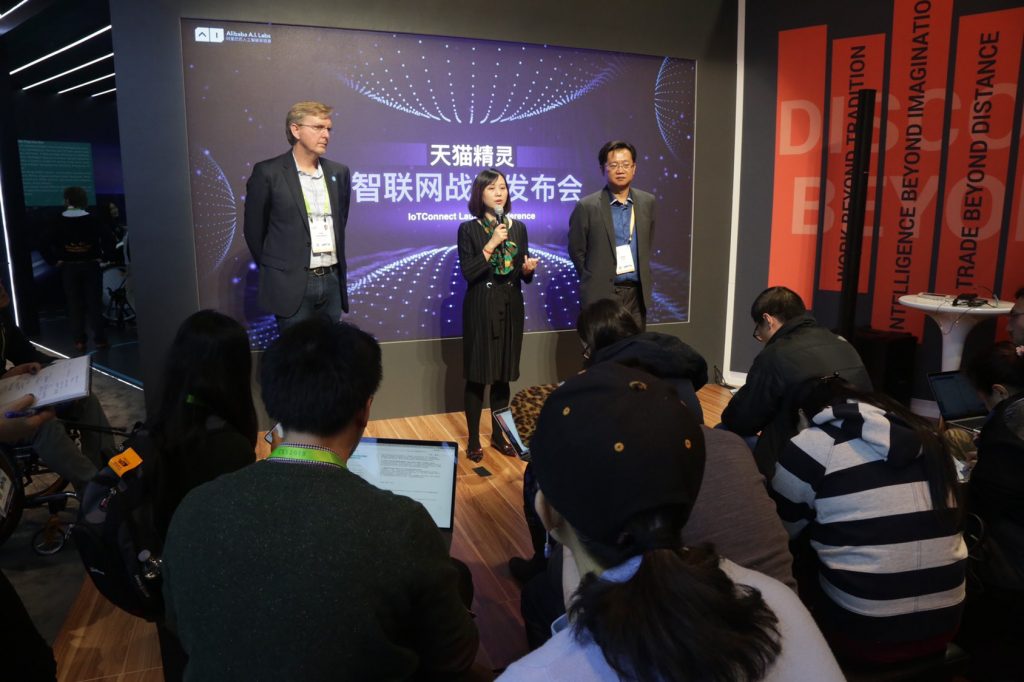
Alibaba said Wednesday its A.I. Labs unit will team up with Taiwan’s MediaTek on an Internet of Things initiative that aims to make homes smarter.
The two are tackling the challenge of creating a single, unified connectivity protocol making it easier for consumers to control home devices through a single portal, rather than a dizzying number of apps and passwords. Protocols are sets of rules that endpoints in a telecommunications connection use when they communicate.
The Alibaba unit and MediaTek said at the Consumer Electronics Show in Las Vegas that they’ll introduce a new Smartmesh connectivity solution to supportBluetooth mesh networking technology, compliant with the latest proposal from the Bluetooth Special Interest Group, the governing body that oversees the networking standard. Mesh networking extends the range of Bluetooth by allowing devices to send and receive data from multiple neighboring devices—a critical capability for many IoT applications.
Through the agreement, Alibaba is set to become China’s first company to introduce Bluetooth mesh technology to the commercial market at scale.
The new solution is based on an open connectivity protocol developed by A.I. Labs, ITConnect, and Bluetooth chips designed by both companies will allow connected home devices to automatically pair with Tmall Genie. Two customized IoT chips enabling faster connection and lower power consumption, MT7581 and MT7583, will debut in China via MediaTek sensor or lighting applications in the second half of 2018.
For consumers, this means they will be able to instantly connect to many devices at once. And for IoT companies and smart home appliance manufacturers, equipping their hardware with the new solution could help them save costs conventionally incurred in connectivity development, Alibaba said.

“Bluetooth mesh technology has the advantages of being open, low-cost, high-efficiency, and it supports the majority of Bluetooth devices in the market. Pushing for a unified connectivity standard will‚Ķlargely cut down risks and costs for smart home manufacturers. At the same time, making the [Bluetooth] chip available to the market can introduce a single standard for different brands and smart assistants of different platforms and help them cut down research expenses and time spent in negotiations,” said Miffy Chan, head of A.I. Labs.
Jerry Yu, general manager of MediaTek’s home entertainment business division, said the collaboration is aimed at building a “voice-controlled smart home ecosystem” of the future. “The smart home market is undergoing tremendous growth as technologies advance. With MediaTek’s strength in connectivity and baseband, computing, and multimedia, coupled with Alibaba’s leading advantages in cloud computing and AI, we are confident that the collaboration will mark a milestone in the development of the IoT era,” Yu said.
The global smart home market was valued at around $24.10 billion in 2016 and is expected to reach approximately $53.45 billion by 2022, according to Zion Market Research.
A.I. Labs launched Tmall Genie in July last year. Over a million smart assistants were sold in China during Alibaba’s 24-hour mega shopping festival in November. Most recent figures from the unit shows users on average spend nearly an hour a day using the smart assistant, with music and alarm clock functionalities the most popular. Currently, about 500 smart devices can be connected to the Tmall Genie, while 300,000 smart home devices are voice-controlled by the smart assistant daily.
Watch this video to seehighlights of the tech giant’s latest innovations in Las Vegas this year.
And the Labs’ ambition goes beyond smart homes, with further plans to expand their IoT footprint to other venues such as hotels, nursing homes and lactation rooms, and eventually to outside of China, though no specific timeline for global ventures.
A.I. Labs is Alibaba’s arm for developing artificial intelligence-powered consumer applications and products, such as the voice-controlled Tmall Genie. MediaTek is a fabless semiconductor company, designing chips, but outsourcing their production. The Taiwanese company develops chips used in wide range of technologies including smartphones, voice-activated smart speakers, bike-sharing systems and other connected devices.




